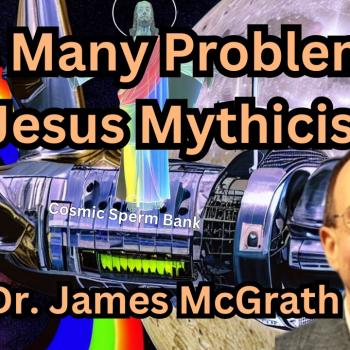The “argument from authority” is a well-known logical fallacy which involves citing an expert as though appeal to the opinion of any one such qualified individual could, on its own, settle the matter.
Mythicists, in my experience, are notorious for appealing to authority. as long as one can find a historian who penned a sentence which, taken out of context, seems to support mythicism, or a New Testament scholar who says something that mythicists agree with, they will be appealed to, even though mythicists reject their most central conclusions, not to mention the whole scholarly enterprise of which they are a part.
To make matters more ironic, however, mythicists will sometimes then go on to object to those who embrace mainstream scholarship, calling that, i.e. reference to the scholarly consensus, an appeal to authority!
It is not an appeal to authority to make reference to the work of other scholars, nor to take for granted a consensus unless one is offering a detailed scholarly challenge to it. Without such footnoting and building upon what has already been done, not only could scholarship not progress, but blog comments would have to be filled with endless citations going beyond the limits of fair use. Finding out what the consensus of experts is, and why it is what it is, is something to be encouraged. The consensus of experts can be wrong, but that doesn’t mean that they are more likely to be wrong than their internet critics.
I think those mythicists who do the things I mentioned above are simply confused. Lack of authority does not become a virtue simply because appeal to authority is a logical fallacy.
As I have explained before on more than one occasion, scholarship works by scholars seeking to discover and explain new things on the one hand, and the community of scholars critically examining and evaluating those new proposals on the other. If you find a scholar who has published something you agree with, congratulations: that means that someone with expertise has made a case for your viewpoint. But keep in mind that that does not mean that the case in question will bear close critical scrutiny and be found persuasive. In fact, given how academia works, keep in mind that it is possible the only reason the idea in question was floated at all was because of the quest for originality needed in order to get a PhD, or to publish rather than perish in the academy.
So, to recap: Lack of authority is not a virtue, just because being an authority doesn’t automatically make one right. A quote from Hobsbawm or Mack or anyone else does not prove that you (or he) is correct about a point, particularly if the quote does not reflect a scholarly consensus (or has been mined and taken out of context, for that matter). And if you’ve ever said “But what about [insert scholar’s name here]?” then please have the courtesy to not hypocritically accuse your conversation partner of appealing to authority.
Appealing to the consensus of authorities is legitimate, in most circumstances, and the fact that someone without expertise thinks they have the most brilliant argument which demolishes the scholarly consensus does not mean that the consensus is wrong. Even scholars sometimes think they have a profound insight that will turn their field upside-down. Most of the times when we think this, we are wrong. How much more, then, are those who are not even working in academic research likely to be wrong, when they make such claims?












